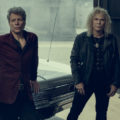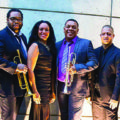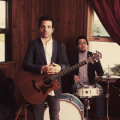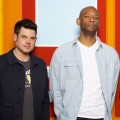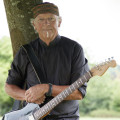Bon Jovi promises entertainment over agenda, gives any local artist a chance to open at United Center
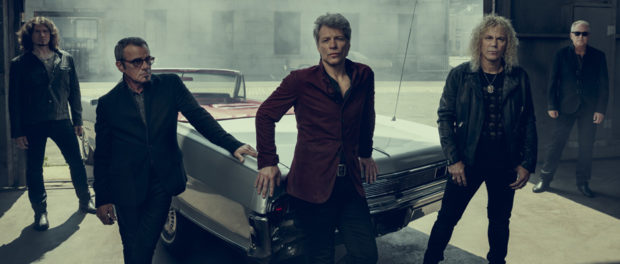 Photos provided by Norman Jean Roy
Photos provided by Norman Jean Roy
When Bon Jovi’s 14th studio album, “This House Is Not for Sale” (Island/UMG), skyrocketed to the top spot of the Billboard 200 last fall, it was only a matter of time before the band announced an arena tour sporting the same name. Armed with a stable of new tunes and too many rock anthems to even mention, it’s sure to fill all 360 degrees of the United Center to the brim on Sunday, March 26, though besides catching the superstar headliners on stage, there’s also a chance for absolutely any local act to score the coveted opening slot via an online contest. Chicago Concert Reviews recently connected with Bon Jovi’s David Bryan (keyboards) and Tico Torres (drums) on a teleconference call from their rehearsal space in Connecticut to hear all about the extravaganza, a 130 million album selling legacy that stretches more than 30 years and why an evening of sheer entertainment is the exclusive item on the agenda when their “This House Is Not For Sale” Tour rolls into town.
Our job is to be performers, have a great night and forget about your problems. Forget about the world’s problems because they were there since the beginning and they’re going to be there till the end…
Bon Jovi tours always have a certain look and technology. What’s this tour going to be like?
Tico Torres: Well, we’re doing it based off of the “This House Is Not For Sale” format and giving it those kind of lines. But it looks like we’re doing a lot more stuff in the round and have some people behind us as well, which we always loved. Instead of the proscenium, [we will] be able to have actual fans behind you while you’re playing. And it’s quite simple and it’s movable. There’s a lot of motion that goes with the songs.
 David Bryan: We’re selling all the way around. This one is really concentrating on the music, not so much video screens. We have such a body of work now, it’s really getting all the songs and it’s about the band.
David Bryan: We’re selling all the way around. This one is really concentrating on the music, not so much video screens. We have such a body of work now, it’s really getting all the songs and it’s about the band.
What kind of video submissions are you guys getting thus far for the opening act contest?
Bryan: We had done it before and we’re doing it again. I think it does two things. The big thing is that it really just helps out young acts to get out there and play. And we’re doing ones in every market. We have 30 shows, so there’s almost 28 cities in America. There’s a lot coming in. It really helps out that young person and that young band that’s trying to make it. We remember that. It’s a different world than when we started out, but I think it’s good.
How do you weed through that process?
Torres: Live Nation actually weeds through it and then we get the tail end of it and then we look at it so we’re not sitting there going through a million bands.
Why is it important for veterans like yourself to give back to the younger community? And what other advice do you have to new artists and bands coming up today?
Torres: Well, a couple of things. When we grew up, there was a million clubs to play at. That’s before disco came in and DJ’s and club owners decided it was cheaper to have one guy instead of a band. And that hurt local music, I think a lot, in not only New Jersey and New York, but around the country. It’s harder to find venues for guys to play at. And I’m glad we grew up in our era because we had plenty of places to play at. You’re going to see a resurgence, like there is in life. It always comes back in not only music styles, but ideals of how to play music. Maybe this is one way to let the kid or man or woman that’s playing music say, “I’d like to put my stuff out there.” And then you never know. You might find a shining star and just by supporting it, it’s kind of cool. They’ll be able to go out there and play for thousands of people.
Bryan: …And the advice is write songs. It takes a lot of hard work to get lucky, so you’ve got to be in it to win it. You’ve got to be out there working and playing and working and playing…
Could you talk about the overall generational appeal of the band?
Bryan: We started out a long time ago and we’ve managed to just keep writing current songs and have number one current records. And we keep bringing along those fans and then those fans are growing up and having kids, and then those kids [are coming to the concerts], so for us, it is multi-generational…You can still have a little kid singing a new song and still singing “Livin’ On A Prayer.” It’s a nice compliment to the power of a band and the power of a good song.
Torres: Music is always ageless and timeless, I think. I remember when The Beatles came out and I think their music still is strong, if not stronger than it was then. You grow up with what you grow up with and it’s kind of nice to be part of that with young people.
The world has changed so much since you last went on tour. Are you guys going to incorporate any of your thoughts on current events into the new show? Or is it shaping up to be strictly a night of entertainment?
Bryan: I mean, it’s been three years. I don’t know if the world changed that much in three years, but it definitely changes every day. But for us, those changes are reflected in the records and the songs and then we get out there. Our job is to be performers, have a great night and forget about your problems. Forget about the world’s problems because they were there since the beginning and they’re going to be there till the end…Everybody in the world has problems and the nice thing about entertainment is you get to forget about those problems and have a good time for a couple of hours.
 What about the changes that have happened in the band, specifically on this album, where you don’t have a very key songwriter and player? Can you speak about that? Or do you want to avoid that subject?
What about the changes that have happened in the band, specifically on this album, where you don’t have a very key songwriter and player? Can you speak about that? Or do you want to avoid that subject?
Bryan: I could speak to that. We have been speaking about it. It’s the first record without [original guitarist/co-writer] Richie [Sambora], and we haven’t been in communication with him since the last tour – well, since 15 shows into the last tour…He’s decided to not be in it anymore and we decided to keep going. And we’re going to keep going. And I think this record was just everybody stepping up and saying, “this house is not for sale. This is what we want to do…” We just had to step forward and do everything. We had to make a great record and we got a number one record in over 30 countries. We’re working and we’re still having fun. Is it the way we wanted it? No. But it’s not our decision…
Can you just talk about what Phil X brings to the band in a live setting that might be a little bit different than playing with Richie?
Bryan: Phil really helped us out in a time of need. Richie is battling his demons and Phil was there for us and came out and we didn’t know whether it was going to be one show or 10 shows or now three years. He definitely helped us when we needed it the most. He’s a great player and he’s got great energy. We welcome him and thank him.
Bryan: Of course, it changes the sound. I mean, it’s a different avenue. You can’t ever replace anybody because Richie is incredibly talented. [There’s] his voice and there was a character of the part of the band that we grew up with and everybody else grew up with. But the nice thing about Phil is he adds his own dimension. You have to show that on the new record and we tried to do that, as well as have John Shanks, our producer, play guitar on this record and play with us live. They add different elements to it and I think it’s positive and sounds very good. We’re moving on. I think it’s something people will enjoy.
There’s been a lot of discussion in the last few years about rock music not doing as well on the charts as it used to do, but obviously you guys put out a number one record. Do you feel like you’re sort of holding the torch a for rock after so many years? And do you think that there will be a resurgence for rock in the future?
Bryan: The hardest thing in the world is to get a number one record, and then when you get one, the hardest thing in the world is to get another one. And then, it’s harder and harder and harder as it keeps going on. Here we are so many years later and we still have a number one record. It’s because it’s not luck; it’s effort. And we work our asses off to find those songs and get in the studio and experiment and move forward and not rest upon “You Give Love A Bad Name” for the 50,000 time. [We] just keep moving on and moving on and progressing. And so, when it comes in at number one, that’s not a given and it’s a statement that makes us very happy that we’re a current classic. We can be on classic radio and we can be on current radio. And if we’re the ones who can fly the flag of rock and roll and run up the hill, we planted it on the top so everybody can. That’s a good thing for rock and roll.
Bon Jovi performs at the United Center on Sunday, March 26. For additional details, visit LiveNation.com and BonJovi.com/2017-Opening-Act-Contest/.

